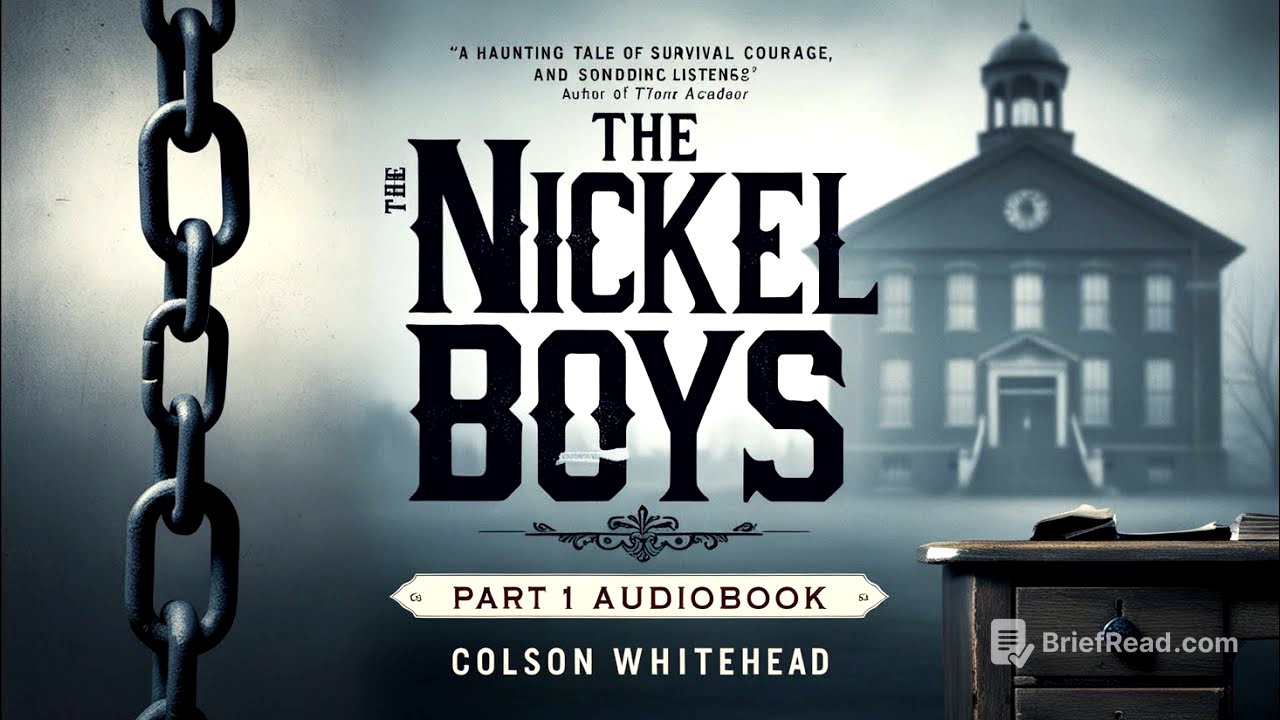TLDR;
This summary covers Chapters 1-8 of Colson Whitehead's "The Nickel Boys". The story centres on Elwood Curtis, a young black boy growing up in Tallahassee, Florida, in the 1960s, who is heavily influenced by the speeches of Martin Luther King Jr. and his belief in dignity and worth. Elwood's life takes a turn when he is wrongly accused of stealing a car and sentenced to the Nickel Academy, a reform school with a dark history of abuse and corruption.
- Elwood receives a Martin Luther King record for Christmas, shaping his worldview.
- Despite working hard and staying out of trouble, Elwood is sent to Nickel Academy.
- Nickel Academy presents a facade of reform but is rife with physical and psychological abuse.
- Elwood befriends Turner, who offers a contrasting perspective on survival within the system.
- Elwood experiences the brutal reality of Nickel firsthand, leading to a loss of innocence.
Chapter 1 [0:00]
Elwood receives a Martin Luther King Jr. record for Christmas in 1962, which profoundly influences his life. Growing up with his grandmother Harriet, Elwood is restricted from listening to popular music due to its "licentious nature". The record becomes his source of enlightenment, shaping his understanding of the civil rights struggle. Elwood envisions a future where segregation ends, fuelled by King's speeches. He dreams of visiting Funtown, an amusement park, and believes his excellent school reports will grant him free admission when it opens to all, reflecting his optimism and adherence to King's teachings. Harriet works at the Richmond Hotel, and Elwood observes the kitchen staff after school. He initially enjoys their company and plate-drying races, but new staff members exploit his eagerness, leading to a competition for a set of encyclopaedias. Elwood wins, only to discover the books are blank, a cruel joke that foreshadows the deceptions he will face.
Chapter 2 [14:00]
Elwood's departure from the Richmond Hotel kitchen marks the end of his private game of predicting whether black patrons would visit the dining room, a reflection of his hope for desegregation following Brown v. Board of Education. Despite the Supreme Court's ruling, his grandmother remains sceptical about immediate change. Elwood's diligence attracts offers of employment from white men, including Mr. Maronei, the proprietor of the tobacco shop. Elwood begins working at Maronei's, where he organises newspapers and comic books, and becomes engrossed in "Life" magazine's coverage of the civil rights movement. Inspired by images of young protesters facing violence, Elwood feels compelled to join the struggle. His grandmother disapproves, fearing the consequences of acting "above your station". Despite her warnings, Elwood asks Mr. Maronei for a day off to participate in a protest at the Florida Theater.
Chapter 3 [34:27]
At Lincoln High School, Elwood and his classmates receive used textbooks defaced with racist slurs from the white high school. Mr. Hill, a new history teacher and former Freedom Rider, encourages them to black out the offensive words. Mr. Hill shares his experiences in the civil rights movement, inspiring Elwood. Elwood's dedication to his studies and his role in the Emancipation Day play earn him the respect of the faculty. He participates in a protest at the Florida Theater, defying his grandmother's wishes. She responds with the silent treatment and bans his record player. Mr. Hill suggests Elwood take free college courses at Melvin Griggs Technical College. Mr. Maronei gifts him a fountain pen for his education. On his way to his first class, Elwood accepts a ride from a man named Rodney, leading to his wrongful arrest for car theft.
Chapter 4 [1:02:51]
Following his arrest, Elwood spends three final nights at home before being transported to the Nickel Academy. The journey is marked by the officer's silence and a mix-up at a jail in Tampa. Elwood is chained alongside two white boys, Franklin and Bill, who are also headed to Nickel. Franklin, a repeat offender, provides a bleak outlook on the academy, while Bill expresses his disdain for being caught for a minor offence. The officer reveals Elwood's alleged crime, further alienating him from the others. As they approach Nickel, Elwood is surprised by its well-maintained campus, a stark contrast to the reformatory he had imagined. Superintendent Spencer delivers a stern introduction, outlining the academy's ranking system and the consequences of disobedience. Elwood is assigned to Cleveland dormitory under the supervision of Mr. Blakeley, a seemingly kind house father.
Chapter 5 [1:22:36]
Elwood's second day at Nickel reveals the harsh realities beneath the surface. He meets Turner, a cynical boy who warns him against being too eager to please. The daily routine includes a frigid, communal shower and a breakfast in a rowdy mess hall. Elwood encounters Griff, Lonnie, and Black Mike, a trio of bullies. He also discovers the school's lacklustre academic standards and Mr. Goodall's indifference. Elwood is assigned to the yard crew, where he learns about the campus, including the graveyard known as Boot Hill. He is warned to avoid a small, mysterious building. In the recreation room, Elwood observes the dynamics of the dormitory and the roles of the housemen and student captain. An air horn signals an unknown event. Elwood intervenes in a bathroom fight between Lonnie, Black Mike, and a younger boy named Cory, leading to his own punishment.
Chapter 6 [1:44:43]
Elwood, along with Lonnie and Black Mike, is taken to the White House, a place of brutal punishment. The White House is described as a workshed with a history of violence. The boys are subjected to beatings with a leather strap while a loud fan masks their screams. Elwood attempts to count the number of blows, but loses track and eventually passes out. The experience leaves him traumatised and questioning the system of justice at Nickel.
Chapter 7 [1:51:56]
Harriet's history of abrupt goodbyes to loved ones is explored, highlighting the recurring theme of loss and injustice in her life. She reflects on the deaths of her father and husband, as well as the disappearance of her daughter and son-in-law. Her visit to Elwood at Nickel is thwarted when she is told he is too sick to receive visitors. Elwood spends his hospital stay recovering from the beating. He meets Nurse Wilmer and Dr. Cook. Turner, feigning illness, joins Elwood in the hospital ward and offers a cynical perspective on Nickel's realities. Elwood reads a pamphlet about Nickel's history, which presents a sanitised version of the school's purpose and achievements. Turner reveals the grim fate of some boys who are taken to the White House and never seen again.
Chapter 8 [2:18:47]
Upon his release from the hospital, Elwood returns to the yard crew. He finds himself struggling with anger and violence. His attempts to improve his education are futile, as Mr. Goodall remains indifferent. While cleaning out the schoolhouse basement, Elwood discovers a set of British classics. He is unable to tell his grandmother about the horrors he experienced. On visiting day, he conceals the truth and assures her that he is coping.









